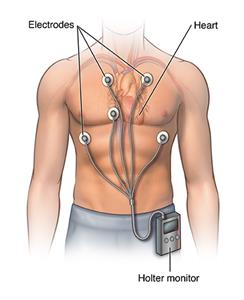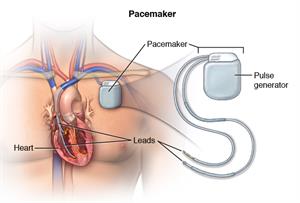Sick Sinus Syndrome
What is sick sinus syndrome?
Sick sinus syndrome (SSS) is a disease in which the heart's natural pacemaker located in the upper right heart chamber (right atrium) becomes damaged and is no longer able to generate normal heartbeats at the normal rate. It may be a result of other medical conditions that damage the sinoatrial node (SA node) over time or may be a result of certain medicines. This can result in heartbeats that are too slow, too fast — or heartbeats that alternate between slow and fast.
What causes sick sinus syndrome?
Any condition that can cause heart damage can damage the SA node. This includes:- Coronary artery disease
- Prior heart attack
- Atrial fibrillation
- Heart failure or cardiomyopathy
- Taking certain medicines such as beta blockers, calcium channel blockers, digoxin, and antiarrhythmics
- Severe hypothyroidism
- Inflammatory conditions that involve the heart (rheumatic fever, Chagas disease, pericarditis, myocarditis)
- Infiltrative heart diseases (sarcoidosis, amyloidosis, scleroderma, hemochromatosis)
- Electrolyte abnormalities such as high potassium levels
- Rare familial disease
- Trauma
Hypothyroidism, hypothermia, and electrolyte problems are generally reversible.
What are the risk factors for sick sinus syndrome?
Sick sinus syndrome affects men and women equally, and can occur at any age. But most cases of SSS occur in people over age 70, because aging tends to slow the heart rate and lower SA node function.You are at greater risk for SSS if you have any of the following conditions:
- Coronary artery disease or history of heart attack
- Heart failure or cardiomyopathy
- Atrial fibrillation
- Inflammatory conditions that can involve the heart such as rheumatic fever, pericarditis, Chagas disease, or myocarditis
- Infiltrative heart diseases such as sarcoidosis, amyloidosis, hemochromatosis, or scleroderma
- Hypothyroidism
- Rare familial diseases
- Trauma
You are also at greater risk of you take medicines such as beta blockers, calcium channel blockers, digoxin, antiarrhythmics.
What are the symptoms of sick sinus syndrome?
You may have sick sinus syndrome with few or no symptoms. If you do have symptoms, they may include:
- Dizziness
- Fainting
- Shortness of breath, especially with exertion
- Heart palpitations
- Chest pain
How is sick sinus syndrome diagnosed?
Your healthcare provider may suspect sick sinus syndrome based on your symptoms, but they are common in many other diseases. To diagnose your condition, your healthcare provider will do an electrocardiogram (ECG). This is a machine that records your heart's rate and rhythm. If you do not have symptoms at the time of your ECG, it may look normal.
Other possible tests include:
- An ECG while you walk on a treadmill (stress test)
- A Holter monitor, a recorder you wear for over 24 hours that takes an ECG
- An event recorder, a recorder you wear over several days that samples your heart rate
- Electrophysiologic testing, a hospital procedure that involves threading catheters into your heart through a vein in your thigh
- Echocardiogram or ultrasound of your heart, which checks for structural heart problems
How is sick sinus syndrome treated?
You may have sick sinus syndrome without symptoms and not need treatment. However, if you do have symptoms and need treatment, there are options, such as:
- Medicine change. Your healthcare provider may change your medicines if you are taking any known to cause sick sinus syndrome.
- Blood thinners. Because there is an increased risk for blood clots forming in your heart and causing a stroke, you may need to take a blood thinner as a preventive step.
- Pacemaker. The most common treatment for people with symptoms that do not have an identifiable reversible causes is a pacemaker implant. This is a small, battery-powered device that takes the place of your SA node and regulates your heart rate. A doctor places a pacemaker under the skin of your chest during a minor surgical procedure. Wires are placed within the heart that can monitor the heart rate and stimulate the heartbeat when needed.
What are the complications of sick sinus syndrome?
Sick sinus syndrome often progresses over time. When your heart beats too slowly, or too quickly, it can lead to complications:
- You may be injured if you pass out during an arrhythmia.
- Cardiac blood flow may be impaired leading to other organ damage such as brain and kidney function
Living with sick sinus syndrome
The aging of your SA node causes most cases of sick sinus syndrome, and there’s no way to prevent that. But you can help prevent complications by learning as much as you can about the disease and working closely with your cardiologist to find the best treatment.
You can also make healthy lifestyle changes:
- Don't smoke.
- Work with your healthcare provider to keep conditions like high cholesterol and high blood pressure under control.
- Eat a heart-healthy diet.
- Maintain a healthy weight.
- Get regular exercise.
- Tell your healthcare provider if you have any symptoms.
Key points
- Sick sinus syndrome is a slow heart rate.
- The most common cause is a gradual loss of SA node function that comes with age.
- You may have no symptoms or you may experience dizziness, fainting, shortness of breath, or fatigue.
- Sick sinus syndrome may be treated by changing your medicines, treating underlying medical conditions, or inserting a pacemaker.
- Not smoking, keeping your cholesterol and blood pressure under control, eating a healthy diet, maintaining a healthy weight, and getting regular exercise can help reduce the risk of sick sinus syndrome.
Next steps
Tips to help you get the most from a visit to your healthcare provider:
- Know the reason for your visit and what you want to happen.
- Before your visit, write down questions you want answered.
- Bring someone with you to help you ask questions and remember what your provider tells you.
- At the visit, write down the name of a new diagnosis, and any new medicines, treatments, or tests. Also write down any new instructions your provider gives you.
- Know why a new medicine or treatment is prescribed, and how it will help you. Also know what the side effects are.
- Ask if your condition can be treated in other ways.
- Know why a test or procedure is recommended and what the results could mean.
- Know what to expect if you do not take the medicine or have the test or procedure.
- If you have a follow-up appointment, write down the date, time, and purpose for that visit.
- Know how you can contact your provider if you have questions.







